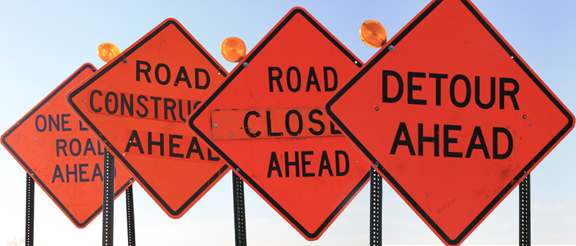 We are in the midst of heavy construction season.
It seems like every time I try to drive anywhere, there is another road closed
for repairs. Just today, I was detoured down a congested street (along with
half the city it seemed) for a new closure.
We are in the midst of heavy construction season.
It seems like every time I try to drive anywhere, there is another road closed
for repairs. Just today, I was detoured down a congested street (along with
half the city it seemed) for a new closure.
Detours are pretty commonplace this time of year
where I live. You learn to find a way around the construction to get where you
need to go. Do you know where else detours are common? In your business plan – specifically that part of your business plan that deals with marketing and
sales strategies. We are living in economic times that are sometimes hard to
predict. Typically, a corporation will project their sales and set annual
goals. Budgets are set by these numbers. Sales numbers are measured against this
goal as the year progresses. Marketing is responsible to help sales achieve
that goal by attracting business to your brand. But what happens when the
market fluctuates and your plan is no longer working? Good strategic marketing
plans should be built to adjust to changing times.
How do you change your marketing strategy in the
middle of the year? First, build a firm, but not a rigid plan. There is a
difference between driving a train down a railroad track and an automobile down
a road. The train's direction is predetermined by the direction the track
goes. When railroad construction happens, all rail traffic is stopped.
Automobiles are different. They are much more flexible in where they can
travel. They have the ability to drive around problem areas. Build your
marketing strategy like you are driving a car, not a train. That requires you
to measure your success in getting prospective customers to buy your products
and services on a periodic basis throughout the year. If things are going well,
stay the course, but if sales are not happening at a pace to meet your goals,
make a change.
Another thing to consider when you are building
your marketing strategy is to make sure you are not putting all your efforts
into just making your brand aware to your target market. This is a common
marketing mistake. People will not necessarily buy your products and services
by just knowing about them. A good marketing strategy also helps potential
customers take the next step to buy the brand – it makes it easy for them to
do so. This is a place where strategies most commonly need to change when the
detour signs go up. Good marketing makes a strong case to make a purchase by
removing any excuses the customer might have to complete the purchase.
With that in mind, a critical place to watch your
marketing methods deals with how quickly a prospect transitions from knowing
about your brand to actually buying something from you. If your marketing
strategy needs to speed up that transition, find out what causes people to buy
from you. Is there a special incentive needed to get them to say yes to a sale?
Is there a particular roadblock in their way? What can you do to remove that
block or go around it? Do what you need to do to keep the consumer engaged with
your brand until they decide to purchase it.
Good marketing plans find the best detours around
problems in the marketplace that would keep consumers from purchasing from you.
Take account of the market conditions. Ask your customers what they are
currently thinking and feeling. Adjust your marketing strategy accordingly.